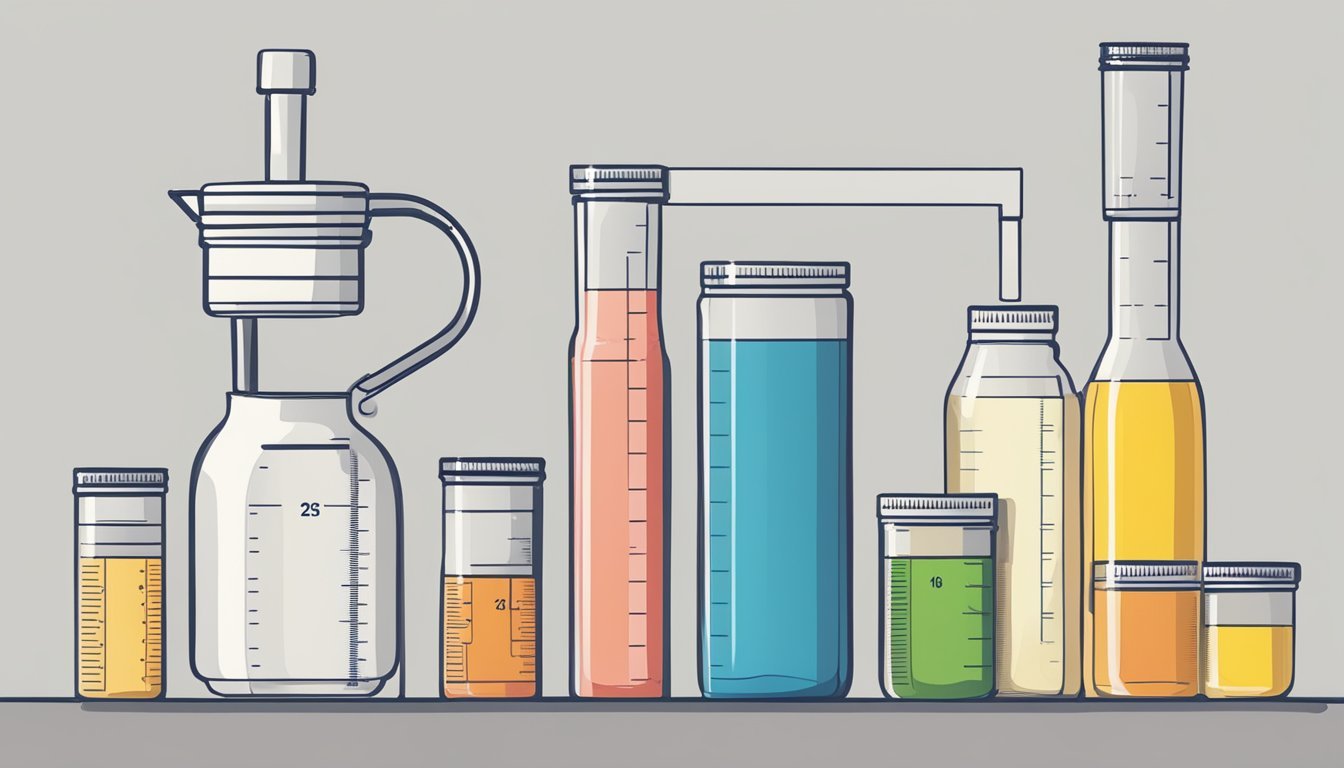How Many Servings of Electrolit Is Too Much
Expert Guidelines Explained
Determining the right amount of Electrolit—the popular electrolyte drink—can be crucial for anyone aiming to stay hydrated. Electrolytes are vital for many bodily functions, including muscle contractions and nerve signaling. Consuming too many servings of Electrolit can lead to an imbalance of electrolytes, causing symptoms like confusion and irritability.
While staying hydrated is essential, it's important to recognize that moderation is key. An excessive intake of electrolytes, particularly sodium, can contribute to health issues such as high blood pressure and swelling. Active individuals may require more electrolytes than those with a sedentary lifestyle, but overconsumption can be just as harmful as dehydration.
Aiming for a balanced intake ensures that your body runs smoothly without tipping the scales too far. Reading nutritional labels and understanding your body's specific needs can help manage electrolyte levels effectively. Thus, it's wise to consume electrolyte drinks like Electrolit in moderation to maintain overall health and hydration.
Understanding Electrolytes
Electrolytes are essential minerals that play critical roles in maintaining various physiological functions, including hydration, nerve signaling, and muscle contractions. A balance of these minerals is crucial for overall health.
Role of Electrolytes in the Body
Electrolytes help regulate fluid balance, muscle contractions, and nerve signals. Sodium, for instance, is crucial for maintaining fluid balance and blood pressure. It aids in nerve impulses and muscle function.
Potassium is essential for muscle contraction, including that of the heart, and helps in maintaining a regular heartbeat. It also aids in nerve function and balances the effects of sodium.
Chloride works alongside sodium to maintain fluid balance and is a key component of stomach acid, which aids digestion. Magnesium supports over 300 enzyme reactions, muscle and nerve function, blood sugar levels, and blood pressure regulation.
Calcium is vital for bone health, muscle function, and neurotransmission. It plays a key role in blood clotting and cellular signaling. Phosphate is necessary for energy production and the formation of bones and teeth. Bicarbonate acts as a buffer to maintain the pH balance of the blood.
Types of Electrolytes
Electrolytes include minerals like sodium, potassium, chloride, magnesium, calcium, phosphate, and bicarbonate, each having unique functions.
Sodium: Maintains fluid balance, nerve function, and muscle contractions.
Potassium: Essential for cardiac function, muscle contraction, and nerve signaling.
Chloride: Works with sodium to balance fluid levels and is vital for digestive enzyme production.
Magnesium: Participates in enzyme reactions, muscle and nerve functions, and blood pressure regulation.
Calcium: Strengthens bones, supports muscle function, and assists in neurotransmission and blood clotting.
Phosphate: Integral in energy production and the formation of bones and teeth.
Bicarbonate: Helps maintain acid-base balance in the bloodstream.
Understanding the specific functions and importance of these electrolytes can aid in making informed decisions about diet and hydration.
Electrolit as a Source of Hydration
Electrolit serves as an efficient hydration method, especially for those with high fluid loss. The beverage contains essential electrolytes and offers specific benefits compared to other hydration methods.
Benefits of Electrolit Hydration
Electrolit provides necessary electrolytes such as sodium, potassium, and magnesium, which are critical for maintaining fluid balance in the body. These minerals help in quick rehydration by replacing what is lost through sweat, making them ideal for athletes and individuals engaging in physical activities.
The presence of carbohydrates in Electrolit assists in the absorption of fluids faster than plain water. This rapid absorption helps in reducing the risks related to dehydration like cramps and fatigue. Moreover, Electrolit is often flavored, making it more palatable and encouraging higher fluid intake.
Comparison to Other Hydration Methods
Traditional methods like water and various sports drinks provide hydration, but Electrolit offers a more targeted approach. Unlike plain water, which does not contain electrolytes, Electrolit addresses the loss of vital minerals. This is particularly crucial when dealing with high fluid loss scenarios such as intense exercise or illness.
Compared to other sports drinks, Electrolit usually has a balanced composition of electrolytes and sugar, aiding in efficient hydration without excessive sugar intake. Some sports drinks may contain more sugar or fewer essential minerals, making Electrolit a more balanced choice for rehydration.
By combining the essential aspects of electrolyte replenishment and fluid intake, Electrolit stands as an effective solution for those requiring robust hydration support.
Recommended Intake of Electrolytes
Electrolytes are essential for various bodily functions, including hydration, nerve function, and muscle contraction. Adequate intake varies based on factors such as age, diet, and physical activity levels.
Daily Electrolyte Requirements
Daily requirements for electrolytes like sodium, potassium, and chloride depend on several factors, including age and gender. For example:
Sodium: Adults should consume 1,500 to 2,300 mg per day.
Potassium: The recommended intake for adults is around 2,500 to 3,000 mg daily.
Chloride: This ranges from 2,300 to 3,600 mg per day.
Electrolytes must be balanced for proper cellular function. Excess intake, particularly through supplements and sports drinks, can lead to imbalances, causing health issues like hypernatremia or hyperkalemia.
Factors Influencing Electrolyte Needs
Individual electrolyte needs can vary significantly. Age is a crucial factor; children and older adults often require different amounts than the general adult population.
Diet also plays a role. High-sodium foods or potassium-rich vegetables can help meet daily needs without supplements.
Physical activity levels influence electrolyte requirements. Athletes, due to sweat loss, often need higher intakes to prevent dehydration and maintain performance.
Various health conditions, such as chronic kidney disease, can alter how the body processes these minerals, leading to adjusted dietary recommendations.
Understanding these factors can help optimize electrolyte intake for better health and performance.
Identifying Overconsumption
Consuming too many electrolyte drinks like Electrolit can lead to a variety of health issues. Important factors to consider include recognizing the symptoms of overconsumption, understanding the associated risks, and how the body regulates electrolyte balance.
Symptoms of Electrolyte Imbalance
Overconsumption of electrolytes can result in a range of symptoms. Fatigue, nausea, and headache are common early signs.
Severe symptoms may include:
Confusion and irritability
Muscle cramps
Irregular heart rate (arrhythmias)
Shortness of breath
For instance, excessive sodium (hypernatremia) can cause dehydration, whereas too much potassium (hyperkalemia) might result in dangerously irregular heartbeats.
Risks Associated with Excess Intake
Consuming too many electrolytes can have serious health risks. High sodium intake can increase blood pressure and lead to conditions such as heart disease or stroke.
Potential risks include:
Hypernatremia: Elevated sodium levels, leading to dehydration and high blood pressure.
Hyperkalemia: High potassium levels, which can cause heart failure.
Hyponatremia: Low sodium levels due to water retention, causing brain swelling.
Understanding these risks is crucial for anyone regularly consuming electrolyte drinks, especially those with underlying health conditions.
Electrolyte Balance and Homeostasis
The body's ability to maintain electrolyte balance is critical for health. Homeostasis ensures optimal functioning of muscles and nerves.
Key points:
The kidneys play a significant role in regulating electrolyte levels by filtering excess salts and maintaining the balance.
Dietary guidelines recommend specific daily limits for electrolytes like sodium (no more than 2,300 mg/day) to support homeostasis.
Hydration and a balanced diet are essential for maintaining the appropriate electrolyte levels.
Maintaining this balance is vital to avoid complications related to overconsumption.
Factors Contributing to Electrolyte Overload
Electrolyte overload can occur due to several external and internal factors. This section discusses how environmental conditions, lifestyle choices, medical conditions, and medications play a significant role.
Environmental and Lifestyle Factors
High-intensity physical activities, especially in hot climates, lead to excessive sweating. This increases the intake of electrolyte drinks, potentially causing an overload.
Athletes often consume multiple servings without realizing the risks. Furthermore, certain diets that emphasize high-sodium foods can also increase electrolyte levels.
In hot and humid environments, individuals may drink more electrolyte solutions to stay hydrated, inadvertently leading to an imbalance. It's crucial for people in these scenarios to monitor their electrolyte consumption closely.
Medical Conditions and Medications
Certain medical conditions can exacerbate electrolyte imbalances. Kidney disease, for instance, impairs the body's ability to filter and balance electrolytes effectively.
Health conditions such as cardiovascular disease or hypertension also affect electrolyte levels. Patients with these conditions should be cautious.
Medications, including diuretics and corticosteroids, can further disrupt electrolyte balance. Understanding how these factors contribute to an overload helps manage intake and prevent complications.
Individuals with these health issues must consult healthcare providers before increasing their electrolyte consumption.
Safe Consumption Guidelines
Understanding the appropriate intake of electrolytes is crucial to maintaining optimal hydration and health. This section covers hydration strategies for different populations and advice on when to consult a healthcare professional.
Hydration Strategies for Different Populations
Athletes: Athletes often have higher electrolyte needs due to increased sweat loss during physical activity. They should focus on rehydration drinks containing sodium, potassium, and magnesium to replace lost electrolytes. Consuming electrolyte-rich beverages during and after workouts can aid in optimal performance and recovery.
Men and Women: The general adult population, including both men and women, can usually meet their electrolyte needs through a balanced diet and adequate water intake. For most people, routine consumption of electrolyte supplements isn't necessary unless they have specific health conditions.
Older Adults: Older adults might need to monitor their electrolyte intake more closely due to age-related changes in kidney function. They should aim to maintain hydration with both water and foods rich in natural electrolytes like fruits and vegetables.
Children: Children should generally get their electrolytes from their diet rather than supplements. They might need electrolyte drinks during prolonged physical activities or illnesses causing dehydration, such as vomiting or diarrhea.
When to Consult a Healthcare Professional
It's important to consult a healthcare professional, like a registered dietitian, in certain situations. People with medical conditions such as kidney disease or hypertension should discuss their electrolyte intake with their doctor due to potential complications from excess sodium or potassium.
Signs of electrolyte imbalance, such as confusion, irritability, or fatigue, should prompt immediate medical consultation. Pregnant women should also seek advice from their healthcare provider to ensure both their hydration levels and electrolyte balance are appropriately managed.
Natural Sources of Electrolytes
Electrolytes are crucial for various bodily functions, including hydration and muscle function. Consuming a balanced diet with natural sources of electrolytes can help maintain these essential levels.
Whole Foods and Electrolyte-Rich Diets
Whole foods offer a variety of electrolytes necessary for optimal health. Spinach, for instance, provides potassium, magnesium, and calcium.
Nuts and seeds, like almonds and pumpkin seeds, are other excellent options. These snacks supply magnesium and can be easily added to meals.
Dairy products such as milk, yogurt, and cheese are rich in calcium and can be consumed daily. Coconut water is a natural beverage high in potassium and is particularly refreshing.
A balanced diet that includes these whole foods helps ensure you're getting a robust supply of essential electrolytes.
Fruits and Vegetables High in Electrolytes
Fruits and vegetables are rich in multiple electrolytes. Bananas, for example, are well-known for their high potassium content, supporting muscle function.
Oranges and melons, such as cantaloupe and watermelon, also provide significant amounts of potassium. Leafy greens like kale and spinach are not only high in electrolytes but also in antioxidants.
Tomatoes and avocados offer a substantial contribution of potassium and magnesium. These ingredients can easily be added to salads or smoothies for an electrolyte boost.
Incorporating a variety of these fruits and vegetables into your diet ensures a steady intake of essential nutrients.
Understanding the Role of Electrolit in Diet
Electrolit plays a pivotal role in maintaining fluid balance, supporting metabolic functions, and regulating weight. Proper integration with other nutrients ensures optimal bodily functions, while its influence on metabolism and weight management highlights its broader importance.
Balancing Electrolytes with Other Nutrients
Balancing electrolytes with other nutrients is essential for overall health. Electrolytes, such as sodium, potassium, calcium, and magnesium, collaborate with other nutrients to maintain fluid balance and optimal cell function. For instance, potassium helps to counteract sodium's effect, aiding in blood pressure control.
A balanced diet rich in fruits, vegetables, and lean proteins provides these essential electrolytes naturally. Adequate hydration is also crucial, as it facilitates the transport of electrolytes and other nutrients throughout the body. Insufficient electrolyte intake can lead to symptoms like muscle cramps and irregular heartbeats. Conversely, excessive intake, often due to overuse of supplements or sports drinks, can lead to imbalances impacting heart rhythm and overall hydration status.
Influence of Electrolit on Weight and Metabolism
Electrolit impacts weight and metabolism by influencing water retention and energy balance. Sodium, for example, can cause the body to retain water, which may affect weight. Potassium plays a role in reducing water retention, helping maintain a more stable weight.
Regarding metabolism, magnesium is vital for energy production and blood glucose control. Proper electrolyte levels ensure that metabolic processes run efficiently, converting food into energy effectively. Weight management benefits from a balanced intake of electrolytes, which support metabolic rates and reduce the risk of fatigue and sluggishness. Precision in electrolyte consumption helps to avoid metabolic slowdowns and supports sustained energy levels throughout daily activities.
Managing Electrolytes During Physical Activity
Proper management of electrolytes is essential during physical activity to prevent dehydration and maintain endurance. It's important to tailor electrolyte intake to the intensity and duration of the exercise.
Electrolit for Workout and Recovery
Electrolytes like sodium, potassium, and magnesium are crucial for physical activity. They help with muscle contractions and nerve signaling.
During workouts, sweat leads to loss of these minerals. Drinking electrolyte-rich beverages, such as Electrolit, can help replenish these losses. This is especially important for activities lasting more than 45 minutes. For rigorous exercise sessions, consuming Electrolit before, during, and after can aid in maintaining fluid balance and preventing cramps.
In recovery, rehydrating with an isotonic drink like Electrolit is recommended, particularly if the exercise was intense or performed in hot conditions. This helps in restoring electrolyte levels and rehydrating the body efficiently.
Tailoring Intake According to Exercise Intensity
The intensity and duration of the physical activity determine electrolyte needs. Low-intensity exercises (e.g., jogging, light aerobics) typically don't require additional electrolytes beyond regular meals and water.
For moderate to high-intensity workouts (e.g., running, swimming), sweat rate plays a key role. Athletes may require 16-24 ounces of an electrolyte drink per hour of activity. In very intense or prolonged sessions, tailored electrolyte strategies ensure optimal performance and hydration.
It's critical to monitor individual sweat rates and thirst to adjust electrolyte consumption appropriately. Consuming too much can have adverse effects, so balance is key. Recommendations vary, with 24 ounces per pound of sweat lost being an ideal goal for rehydration.
Potential Health Consequences of High Electrolyte Intake
High electrolyte intake can cause immediate and long-term health risks, affecting critical bodily functions. Awareness of potential treatments and preventive measures is essential to avoid severe complications.
Short-term and Long-term Health Risks
Excessive electrolyte consumption can lead to a condition known as hypernatremia, characterized by an abnormally high concentration of sodium in the blood. Immediate symptoms include confusion, irritability, and muscle weakness.
Sodium overload can also lead to increased blood pressure, swelling, and in severe cases, heart failure. High levels of potassium, another key electrolyte, can disrupt heart rhythm, potentially causing cardiac arrest.
Long-term consequences are profound. Chronic electrolyte imbalance may contribute to kidney damage or kidney failure. Serious imbalances might escalate to life-threatening conditions such as seizures or coma.
Electrolyte monitoring through blood tests is crucial, especially for those consuming supplements or electrolyte-heavy beverages regularly.
Treatment and Prevention of Electrolyte Disorders
Treatment often involves reducing or stopping electrolyte intake, coupled with adequate hydration. Medical practitioners may administer specific treatments tailored to the type of electrolyte imbalance. For severe cases, intravenous fluids and medications might be necessary to rapidly correct the imbalance.
Preventive measures include consuming balanced electrolytes through diet and avoiding excessive sports drinks, particularly without rigorous physical activity. Regular medical check-ups and blood tests can help detect and prevent imbalances early.
Kidney function monitoring is vital, as kidneys play a major role in regulating electrolyte levels. Patients with preexisting conditions, like heart or kidney disease, should seek medical advice before increasing electrolyte intake. Prudence in electrolyte consumption can mitigate the risk of serious health issues.
Final Thoughts
Managing the right amount of electrolyte intake is crucial for maintaining fluid balance in the body. Overconsumption can lead to a variety of symptoms and health problems.
Signs of Excess Electrolytes:
Confusion and irritability
Irregular heart rate (arrhythmia)
Breathing difficulties
Headache and nausea
Sodium, a primary electrolyte, is often consumed in excess. Federal guidelines recommend no more than 2,300 mg per day, with an ideal limit of 1,500 mg for most adults.
Electrolyte Functions:
Nerve function
Muscle control
Heart rate regulation
Maintaining PH balance
For those who sweat heavily or engage in intense physical activity, adjusting intake based on individual needs is essential. A good practice is to start with one serving and assess if additional servings are required.
Maintaining balance in electrolyte consumption is key. Excessive intake, particularly of sodium, can elevate blood pressure and lead to water retention.
Being mindful of the body's signals is important. Symptoms like muscle cramps or fatigue indicate the need for proper electrolyte management.
Balancing electrolytes ensures crucial ion functions are maintained. This includes cations such as sodium and potassium, which are essential for various physiological processes.
Electrolyte beverages can be convenient and effective for quick replenishment, especially for people with higher needs due to lifestyle or health conditions.











